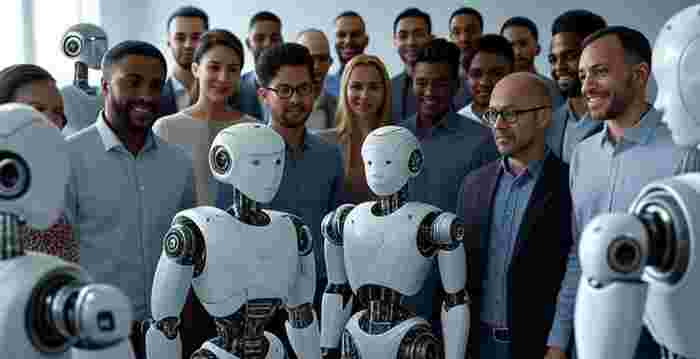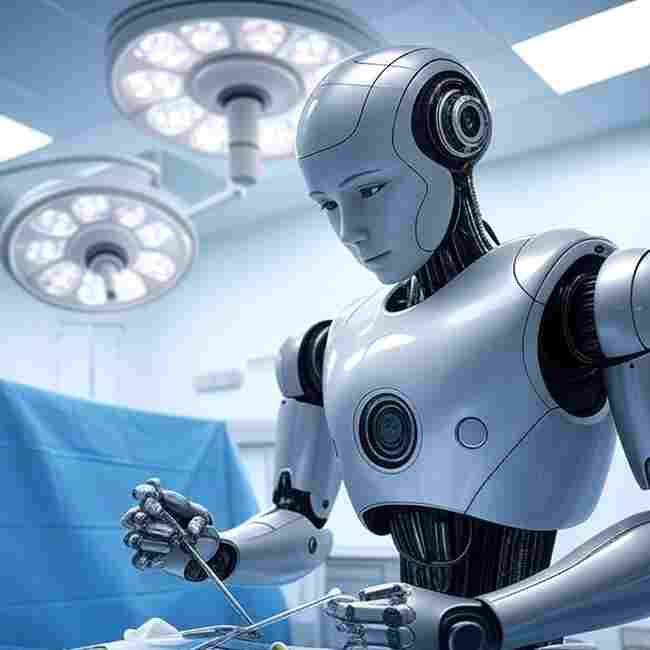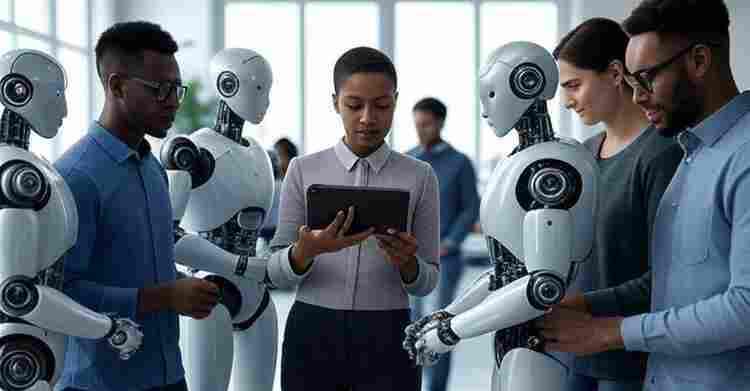Human Tech Coevolution: How Technology Is Rewiring Us
Let’s make a some understandings about Human Tech Coevolution, and where is going. We’re not just using technology. We’re becoming part of it. And it’s changing us in ways most people don’t even notice.
However, this isn’t a sci-fi warning. It’s real, it’s happening right now, and it’s been going on for millions of years.
The idea is simple: humans shape tools, and then those tools shape us right back. It started with sharpened stones and fire. Now it’s smartphones and algorithms.
In fact, that’s human-tech coevolution—and it’s one of the most overlooked forces driving how we think, move, connect, and even feel.
Also, we like to think we’re in charge of our devices. But if you’ve ever lost an hour to scrolling TikTok or felt phantom vibrations in your pocket, you know that’s not entirely true.
So let’s stop pretending tech is just a neutral tool. It’s not. It’s part of our evolution—and we need to start treating it that way.
Human Tech Coevolution This Isn’t New: Tech Has Always Shaped Us
Long before iPhones and smartwatches, early humans were shaping rocks into knives. That one tool—basic as it was—kickstarted changes in how we hunted, cooked, and even how our brains grew.
From fire to farming, printing to electricity, each breakthrough didn’t just help us survive. It changed how we lived. It even rewired our bodies.
That’s the pattern: We invent something to make life easier. Then it rewires how we think, move, and relate to each other.
Now we’re in the middle of the digital chapter. And it’s moving faster than anything before.
Your Brain on Tech: Not Built for This
Your brain didn’t evolve for Instagram notifications or infinite scrolling. It evolved for survival, social bonding, and problem-solving. Tech exploits those exact things.
Apps are built to keep you hooked—literally. They tap into dopamine systems, manipulate your emotions, and reward short bursts of attention. Over time, that reshapes how your brain works.
Multitasking becomes the norm. Deep focus becomes rare. Memory takes a hit. Anxiety goes up.
And because we outsource everything—directions, dates, even thinking—to our phones, we’re slowly giving away control.
Some researchers now call us “cognitive cyborgs.” It’s not a joke. We’re extending our brains into machines, and the line between tool and user is getting blurry.
Tech Has Changed Our Bodies, Too
Our bodies are adapting—just not in good ways.
Before agriculture, we had strong jaws and diverse diets. After farming, we got shorter, weaker, and more disease-prone.
Now we’re stuck at desks. We hunch over phones. Our sleep is trashed. Kids develop myopia earlier. Teens get wrist pain from texting.
This isn’t natural. It’s not evolution in the survival sense—it’s tech-driven evolution. And most of it’s happening without us noticing.
The kicker? The very people building these systems—Big Tech execs—won’t let their own kids use them.
Emotionally, We’re Cracking
Technology promised connection. But most of us feel more isolated than ever.
Social media warps our self-image. It feeds us curated lives and manipulates our emotions with like buttons and outrage loops.
Rates of depression, anxiety, and loneliness are skyrocketing—especially in teens and young adults. And it’s not just correlation. Studies keep pointing to the same cause: too much screen time, too little real connection.
Now, AI’s making things even more confusing. Chatbots that pretend to care. Fake influencers. Just fake news. Also, fake relationships.
And the scariest part? We’re starting to get used to it.
Algorithms Are in Charge—Not You
Here’s the truth: you’re not choosing your content. Your feed is.
Every scroll, click, pause, or reaction teaches algorithms what to show you next. And they’re built to keep you engaged, not informed.
However, think you’re in control? Ask yourself: Did you go looking for that video… or did it find you?
In addition, these algorithms influence everything—from your mood to your politics. And no, they’re not neutral. They’re optimized for profit.
We’re letting machine-learning systems decide what we care about. That’s not freedom. That’s engineered addiction.
Human Tech Coevolution: This Is About Power
The real danger isn’t just that tech is changing us. It’s who controls the tools.
A handful of companies control the apps, the platforms, and the data. They decide what’s visible, what’s amplified, and what gets buried.
Additionally, that’s not just annoying. That’s political. Also, that’s psychological. That’s societal.
And it raises some hard questions:
- What happens when truth becomes optional?
- What happens when real people lose to deepfakes?
- What happens when the next generation prefers AI friends to human ones?
So… What Can You Actually Do? With Human Tech Coevolution
You can’t unplug from modern life entirely. But you can take back some control.
- Turn off push notifications. Seriously, do it now.
- Schedule time away from screens. Don’t let your phone own your time.
- Be picky about the tech you use. Ask: Is this helping me—or hacking me?
- Have real conversations. In person. Without a screen.
- Teach your kids to question the tools, not just use them.
This isn’t about becoming a Luddite. It’s about choosing how you evolve.

How Tech Changed Humanity: The Truth No One Wants to Admit
We like to think technology is new. iPhones, TikTok, ChatGPT—it all feels cutting-edge. But here’s the truth: humans have always been plugged into tech. We’ve never existed without it. From the moment we picked up a rock to crack a nut, the clock started ticking on what scientists now call human-tech coevolution.
It’s not just about gadgets. It’s about who we are, how we think, and what we’re becoming.
What Is Human-Tech Coevolution?
It’s simple. We didn’t evolve first and invent tech later. We grew together. Brains got smarter because of tools. Society changed because of fire, writing, and screens. You can’t talk about being human without talking about the things we’ve built.
This isn’t some TED Talk fluff—it’s backed by archaeology, neuroscience, and anthropology. If you’re wondering why our attention spans are fried or why you panic when your phone dies, start here.
Recommended by Nova News:
From Stone Tools to Brain Hacking
Let’s be blunt. Human evolution didn’t just get nudged by tech—it got flipped inside out.
1. Stone Tools and Fire: The Original Upgrade
A million years ago, some hairy ancestor cracked two rocks together and made a blade. That was the first download. Suddenly we could hunt better, build shelters, protect ourselves. Our bodies didn’t have to change much—our minds did.
Then came fire. Cooked food made digestion easier. That freed up energy to grow our brains. But fire also gave us something wild: nighttime conversations. Language, storytelling, maybe even gossip—it all got lit up around campfires.
Keyword tip: how fire influenced brain development
2. Writing: External Memory for the Human Brain
Fast forward to 5,000 years ago. We start scribbling symbols on clay. That might seem boring today, but it changed everything. Now we could store thoughts outside our heads. Laws, recipes, war plans, spiritual texts—they stopped being oral and became permanent.
That offloading—sticking memory into books or apps—is why we can think bigger today.
So what you think about this: what is cognitive offloading in psychology
3. Printing Press: Thought Goes Viral
In the 1400s, Gutenberg drops the printing press. Suddenly, knowledge isn’t for the rich—it’s for everyone. Education explodes. Religion fractures. Revolutions get inked.
This wasn’t just a shift in how we communicate. It changed what we believe. The press made public opinion a weapon.
Make a research: impact of printing press on society
4. Smartphones: Brain in Your Pocket
You already know how hooked we are. But think about it—how many numbers can you actually remember now? Probably none. Your phone remembers for you.
It’s not just a tool. It’s your external brain. A limb. A crutch. A lifeline.
Long-tail keyword: impact of smartphones on thinking and memory
When your phone dies, you feel lost—and you should. Part of your mind just got shut off.
We Don’t Just Use Tech. We Think Through It.
Let’s get something straight. Tech doesn’t just assist you. It becomes you.
There’s a name for this: cognitive extension.
So, you write notes so you don’t forget. Sometimes you Google facts you don’t bother to learn. You use social media to process thoughts, feelings, opinions. That’s not just support. That’s integration.
Search-optimized term: examples of cognitive extension in daily life
This is great until it’s not. Until we can’t think without it.
Human Tech Coevolution: The Risks We’re Pretending Don’t Exist
We’ve been riding this tech wave for centuries. But the surf’s getting dangerous. Here’s where things go sideways.
Problem 1: Letting Machines Raise Our Kids
Tablets instead of parents. AI nannies instead of real conversation. Some parents think a talking speaker can replace bedtime stories or discipline. That’s not tech—that’s abandonment.
Hot: negative effects of AI on child development
Children learn empathy from humans, not apps. No screen can replace eye contact and warmth. And once they’re raised by machines, they think like machines.
Problem 2: AI Making Life-Or-Death Decisions
Companies use AI to approve mortgages, scan resumes, flag suspects. Sounds efficient, right? Except AI doesn’t understand fairness. Or dignity. Or context.
It mirrors past data. If that data’s biased (spoiler: it is), the results are too.
Search this: can AI be trusted to make ethical decisions
We’re letting algorithms decide who gets hired, who gets jailed. That’s not smart. That’s cowardice.
Problem 3: Believing AI Can Think
Here’s the delusion: “My AI assistant is so smart. It even has a personality.”
No. It has a script. AI doesn’t think. It predicts.
When we start treating machines like people, we stop holding people accountable. That’s not just dumb. That’s dangerous.
You must to know more about this: why AI doesn’t have consciousness
Human Tech Coevolution: How to Stay Human in a World of Machines
Let’s not go full doomer. Also, you can love tech and protect your humanity. Here’s how:
- Create, don’t just scroll. Social media is a tool. Use it to share, not just consume.
- Talk to people. Don’t let relationships rot because texting is easier.
- Teach kids to think critically. Siri isn’t a teacher.
- Use tech, don’t worship it. Your phone is a tool, not your brain.
Fast growing: how to build healthy tech habits
Final Word: You + Tech = A New Species
If you still think you’re separate from your tech, think again.
We’ve been evolving with it for millions of years. It’s not a phase. Also, it’s not a fad. It’s the new biology.
The question now isn’t whether tech will change us—it’s whether we’ll notice before it’s too late.
Stay curious. Stay human.
The Real Story: How You and Technology Are Growing Up Together
In addition, most people think technology is something new—something that just started with the iPhone or maybe the internet. But that’s not even close to true.
Additionally, the truth is: humans and technology have always evolved together. However, from the first stone tools to today’s AI, this relationship has shaped everything about us—how we think, live, and connect.
So, let’s break down what this really means. No fluff. No jargon. Just the raw facts and smart thinking.

What Is Human-Tech Coevolution?
Human-tech coevolution means we didn’t just invent tools—we became who we are because of them. Tools made us smarter. Fire changed how we ate. Language let us teach each other. Now we’re here with smartphones, ChatGPT, and algorithms running our feeds.
Technology isn’t just something we use. It’s something that’s built into how we think and live.
You are not separate from your tech. Your calendar app is part of your memory now. Your social media is part of your social life. And your phone? Let’s be honest—it’s basically your second brain.
We’ve Been Cyborgs Since the Beginning
Moreover, people think using tech makes us less human. That’s wrong.
We’ve always been part-machine in some way. That stick your ancestor used to hunt? That was early human “hardware.” Now we’ve upgraded—phones, wearables, AI assistants. But the idea hasn’t changed: we use tools to survive and grow.
First of all, the great philosopher Tom Chatfield calls us “wise animals.” He’s right. We adapt fast. We think with our tools. And we evolve with them.
Alan Kay Said It Best…
“Technology is anything invented after you were born.”
Think about that. We treat our phones like miracles but ignore the fact that fire, wheels, writing, and electricity were all just as revolutionary.
Every generation thinks their tech is the big one. But it’s all part of the same long story.
Here’s the Catch: Tech Shapes You Too
When you start relying on technology, it doesn’t just help you—it also changes how you think.
- You remember fewer phone numbers.
- You Google everything instead of learning it.
- You trust what your GPS says, even if it’s wrong.
In fact, this is called “cognitive offloading.” Your brain gets lighter, your phone gets smarter. That’s not necessarily bad—but you need to stay aware of what you’re giving up.
AI Isn’t Human: So Stop Treating It Like It Is
But, what do you think about this? AI feels smart. Sometimes it even sounds like it understands you. But it doesn’t. Not really.
It’s just predicting what words go together. No feelings. No values. Just code.
So when people say things like “the AI thinks…” or “AI says this is fair,” that’s dangerous. AI doesn’t think. It computes. And it reflects whatever data it’s trained on—biases and all.
If we don’t stay in charge of what AI does, it will quietly take over decisions that only humans should make.
Recommended by Nova News:
Use Tech, But Stay in Control
You don’t need to quit tech. That’s not realistic. But here’s what you can do:
- Be intentional with what apps and tools you use.
- Limit distractions—your attention is not for sale.
- Practice human skills like empathy, memory, and conversation.
- Take breaks. Log off. Be bored sometimes. That’s where real thinking starts.
Ask Yourself the Big Questions
Tech is changing fast. Faster than laws. Also, faster than schools. Faster than most of us can keep up.
So it’s on you to ask:
- What kind of person do I want to be in a digital world?
- What skills should I keep, even if tech can do them for me?
- Who benefits from this app or platform—and is it me?
Final Thought: You’re Not Just a User. You’re a Creator.
You get to shape how this all plays out.
The tech you use, the values you live by, the way you spend your time online—it all adds up.
So don’t drift. Decide.
Because the future of tech isn’t just about gadgets. It’s about people. Also, it’s about you.

